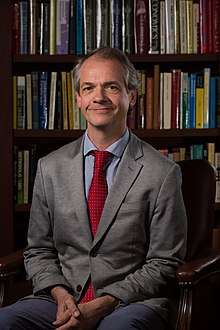Stefan Hofmann
Stefan G. Hofmann (born 1964) is a German-born clinical psychologist at the Department of Psychological and Brain Sciences at Boston University. He is one of the foremost experts in Cognitive Behavioral Therapy, especially for anxiety disorders.

Scientific contributions
Clinical Translational Research
Hofmann has been studying the nature of emotional disorders and the processes through which psychological treatments alleviate suffering by translating discoveries from emotion research and neuroscience into clinical applications.
Pharmacological Augmentation of Psychotherapy
An important mechanism of exposure therapy for anxiety disorders is extinction learning. Hofmann has shown that d-cycloserine, a partial agonist of the glutamate receptor can augment extinction learning and speed up exposure therapy of anxiety disorders.
Emotion Research
Some of his other major contributions are on Mindfulness and research on Emotion in therapy. In particular, he advanced the concept of Interpersonal emotion regulation.
Processes-Based Therapy
In collaboration with Steven C. Hayes, he has been identifying the processes that underlie effective psychological treatments.
Neuromarkers of Psychotherapy
He has been using Magnetic Resonance Imaging to predict the response to cognitive behavioral therapy (CBT).
Awards and recognition
Hofmann has published more than 300 peer-reviewed scientific articles and 20 books and is listed by Clarivate Analytics as a highly cited researcher[1]. He is the former president of the Association for Behavioral and Cognitive Therapies, the recipient of the 2018 Humboldt Prize and the 2015 Aaron T. Beck award for significant and enduring contributions to the field of cognitive therapy. Hofmann is a member of the Academia Europaea.
Selected works
Books
Hofmann, S. G. (2011). An introduction to modern CBT: Psychological solutions to mental health problems. Chichester, UK: Wiley-Blackwell. ISBN 978-0470971765.
Hofmann, S. G. (2016). Emotion in therapy: From science to practice. New York, NY: Guilford Press. ISBN 978-1462524488.
Barlow, D. H., Durand, V. M., & Hofmann, S. G. (2017). Abnormal psychology: An Integrative approach (8th edition). Brooks/Cole Cengage Learning. ISBN 978-1305950443.
Hayes, S. C. & Hofmann, S. G. (Eds.) (2018). "Process-based CBT: The science and core clinical competencies of cognitive behavioral therapy". Oakland, CA: New Harbinger Publications. ISBN 978-1626255968.
Hofmann, S. G. Doan, S. N. (2018). "The social foundations of emotion: Developmental, cultural, and clinical dimensions". Washington, DC: American Psychological Association. ISBN 978-1433829277.
Articles
Hofmann, S. G., Sawyer, A. T., Witt, A., & Oh, D. (2010). The effect of mindfulness-based therapy on anxiety and depression: A meta-analytic review. Journal of Consulting and Clinical Psychology, 78, 169-183. doi:10.1037/a0018555[2]
Hofmann, S. G., Asnaani, A., Vonk, J. J., Sawyer, A. T., & Fang, A. (2012). The efficacy of cognitive behavioral therapy: A review of meta-analyses. Cognitive Therapy and Research, 36, 427-440. doi:10.1007/s10608-012-9476-1[3]
Hofmann, S. G., Sawyer, A. T., Fang, A., & Asnaani, A. (2012). Emotion dysregulation model of mood and anxiety disorders. Depression and Anxiety, 29, 409-416. doi:10.1002/da.21888.[4]
Whitfield-Gabrieli, S., Ghosh, S. S., Nieto-Castanon, A., Saygin, Z., Doehrmann, O., Chai, X. J., Reynold, G. O. , Hofmann, S. G., Pollack, M. H., & Gabrieli, J. D. E. (2016). Brain connectomics predict response to treatment in social anxiety disorder. Molecular Psychiatry, 21, 680-685. doi:10.1038/mp.2015.109[5]
Hofmann, S. G. (2016). Schrödinger's cat and d-cycloserine to augment exposure therapy – both are dead and alive. JAMA Psychiatry, 73, 771-772. doi:10.1001/jamapsychiatry.2016.1132.[6]
Hofmann, S. G. & Hayes, S. C. (2019). The future of intervention science: Process-based therapy. Clinical Psychological Science, 7, 37–50. doi:10.1177/2167702618772296.[7]
Hayes, S. C. & Hofmann, S. G. (2017). The third wave of CBT and the rise of process-based care. World Psychiatry, 16, 245-246. doi:10.1002/wps.20442
Phelps, E. A. & Hofmann, S. G. (2019). Memory editing from science fiction to clinical practice. Nature, 572, 43-50. doi:10.1038/s41586-019-1433-7
References
- https://publons.com/researcher/1264183/stefan-g-hofmann/
- Hofmann, Stefan (2010). "The effect of mindfulness-based therapy on anxiety and depression: A meta-analytic review". Journal of Consulting and Clinical Psychology. 78: 169–183. doi:10.1037/a0018555. PMC 2848393. PMID 20350028.
- Hofmann, Stefan (2012). "The efficacy of cognitive behavioral therapy: A review of meta-analyses". Cognitive Therapy and Research. 36: 427–440. doi:10.1007/s10608-012-9476-1. PMC 3584580. PMID 23459093.
- Hofmann, Stefan (2012). "Emotion dysregulation model of mood and anxiety disorders". Depression and Anxiety. 239: 409–416. doi:10.1002/da.21888.
- Whitfield-Gabrieli, Susan (2016). "Brain connectomics predict response to treatment in social anxiety disoder". Molecular Psychiatry. 21: 680-685. doi:10.1038/mp.2015.109.
- Hofmann, Stefan (2016). "Schrödinger's cat and d-cycloserine to augment exposure therapy – both are dead and alive". JAMA Psychiatry. 73: 771-772. doi:10.1001/jamapsychiatry.2016.1132.
- Hofmann, Stefan (2019). "The future of intervention science: Process-based therapy". Clinical Psychological Science. 7: 37-50. doi:10.1177/2167702618772296. PMC 6350520.